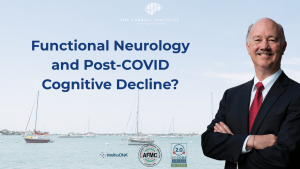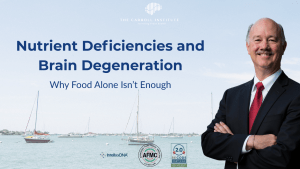What Are the 5 Warning Signs of Alzheimer’s Disease?
Last Updated: October 2025
- Early detection of Alzheimer’s is critical because treatment is most effective before significant damage occurs.
- The five most common warning signs include memory loss, confusion, personality changes, trouble with familiar tasks, and language difficulties.
- At The Carroll Institute in Sarasota, we use the Bredesen ReCODE protocol to identify root causes and restore brain function as early as possible.
- Therefore, recognizing these signs early can make a major difference in outcomes and quality of life.
Identifying early warning signs allows us to intervene sooner with approaches like the ReCODE Protocol.
Why Early Detection Matters
Alzheimer’s disease develops slowly, often years before symptoms become obvious. However, by identifying the warning signs early, it’s possible to slow or even reverse cognitive decline. In fact, research shows that early intervention—especially when using personalized approaches like the ReCODE protocol—can significantly improve brain function and delay progression.
Therefore, if you or a loved one notice any of the following changes, it’s important to seek evaluation right away. Even mild changes can provide valuable clues about what’s happening inside the brain.
1. Increasing Memory Loss That Disrupts Daily Life
One of the earliest and most recognizable symptoms of Alzheimer’s is short-term memory loss. Patients may forget recent conversations, important dates, or tasks they once managed easily. For example, they might ask the same question several times or rely heavily on notes for things they used to remember naturally.
However, occasional forgetfulness is normal with aging. The difference lies in frequency and impact. When memory issues start interfering with daily routines or responsibilities, it may signal a deeper neurological issue that needs to be addressed immediately.
2. Difficulty Completing Familiar Tasks
Another common red flag is struggling to perform everyday activities that once felt effortless. For instance, someone might forget how to operate a microwave, get lost while driving to a familiar location, or struggle to follow a long-time recipe.
As a result, tasks that require multi-step thinking—like managing finances or planning a meal—become overwhelming. At this stage, early functional neurological evaluation can help identify which brain pathways are losing efficiency and how to begin retraining them.
3. Confusion About Time or Place
People in early stages of Alzheimer’s often lose track of dates, seasons, or locations. They may forget where they are or how they arrived there. Additionally, they may have trouble understanding something that isn’t happening immediately.
However, these disorientations aren’t simply about poor memory. They often reflect changes in the brain’s temporal and spatial networks. Therefore, identifying and supporting these specific areas through cognitive rehabilitation and ReCODE therapy can help re-establish better spatial awareness and orientation.
4. Personality or Mood Changes
Alzheimer’s doesn’t just affect memory—it can also alter behavior and emotions. For example, a normally calm and social person may become anxious, withdrawn, or easily frustrated. Furthermore, these mood changes can happen suddenly, often without any obvious external trigger.
Therefore, when personality changes appear, they’re not “just aging.” They often indicate shifts in the brain’s frontal lobe—the area responsible for judgment, impulse control, and social behavior. By supporting these areas with personalized neuro-rehabilitative therapy, mood and confidence often improve alongside cognition.
5. Language and Communication Problems
Many individuals with early Alzheimer’s have trouble finding the right words. For instance, they might pause mid-sentence, repeat themselves, or substitute one word for another. Conversations can feel difficult to follow, and reading comprehension may decline.
As a result, communication becomes frustrating—for both the person affected and their loved ones. However, with targeted cognitive exercises that rebuild language pathways, patients can often regain fluency and confidence in everyday conversations.
For patients experiencing these symptoms, see Alzheimer’s Treatment in Sarasota to learn about available therapies.
What To Do If You Notice These Signs
If any of these warning signs sound familiar, don’t wait. Early evaluation makes all the difference. At The Carroll Institute, we use the Bredesen ReCODE protocol to uncover and treat the root causes of decline—such as inflammation, nutrient deficiencies, insulin resistance, and toxins.
Additionally, we use functional neurology to identify which brain networks are underperforming and to retrain them through neuroplasticity-based exercises. Consequently, we don’t just slow Alzheimer’s—we help the brain heal itself and restore function naturally.
Why Sarasota Patients Choose The Carroll Institute
- Only ReCODE-certified Functional Neurology clinic in Sarasota
- Personalized care addressing both biological and neurological causes
- Collaborative approach with your existing medical team
- Comprehensive testing and measurable progress tracking
- Proven outcomes—over 80% of our patients show improvement
Ultimately, by combining precision medicine with brain retraining, we offer patients and families new hope—hope that cognitive decline doesn’t have to be permanent.
Related Reading
Book a Discovery Call if you’ve noticed these symptoms in yourself or a loved one.
Sources
- Reversal of Cognitive Decline: A Novel Therapeutic Program
- Precision Medicine Approach to Alzheimer’s Disease: Rationale and Implications
- Rationale for a Multi-Factorial Approach for the Reversal of Cognitive Decline
- Sustained Cognitive Improvement Following a Precision Medicine Protocol
Medically reviewed by Dr. Garland Glenn, DC, PhD, IFM, AFMC
The Carroll Institute — Sarasota, FL
Learn about our ReCODE Program | About Dr. Glenn | Book a Discovery Call
This content is for educational purposes only and does not substitute for personalized medical advice.

Dr. Garland Glenn, DC, PhD, IFM, AFMC
Founder & Clinical Director, The Carroll Institute — Sarasota, FL
Dr. Garland Glenn is a board-certified chiropractic physician and functional medicine practitioner specializing in cognitive health, neurodegeneration, and root-cause medicine. Certified as an AFMC (Advanced Functional Medicine Clinician) and Institute for Functional Medicine (IFM) trained, he has also completed over 500 hours of advanced training in Functional Neurology under Dr. Ted Carrick, founder of the Carrick Institute.
At The Carroll Institute, Dr. Glenn leads Sarasota’s only ReCODE-certified Functional Neurology program, helping patients reverse or prevent cognitive decline through the Bredesen ReCODE Protocol, neuroplasticity exercises, and personalized functional medicine care.
Learn more about his background and approach at About Dr. Garland Glenn.
– schedule now –
free discovery call
To help you get started, we offer a free 20-minute Discovery Phone Consultation. During this call, you will be able to talk with one of our Certified Brain Health Coaches about what going on with you or your loved one and find out if we can help. Please review our FAQs prior to scheduling your free call. We look forward to talking with you soon and helping you Save Your Brain.
(yes, it’s totally free!)
ReCODE® is a registered program developed by Dr. Dale Bredesen and licensed through Apollo Health. Dr. Garland Glenn is a certified ReCODE practitioner.



